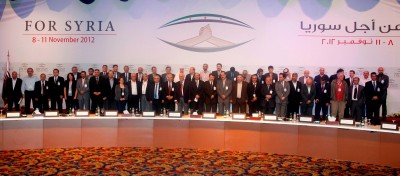 The Obama administration is taking a calculated risk that embracing chosen leaders of Syria’s fragmented rebels will speed the fall of Syrian President Bashar Assad, moving this week to recognize a slate of opposition figures whose pledges of democracy Washington can do little to enforce.
The Obama administration is taking a calculated risk that embracing chosen leaders of Syria’s fragmented rebels will speed the fall of Syrian President Bashar Assad, moving this week to recognize a slate of opposition figures whose pledges of democracy Washington can do little to enforce.
The administration is expected to announce the recognition of a relatively new Syrian opposition group Wednesday when American, European and Arab diplomats meet with its leaders in Morocco.
The action is part of fast-moving diplomacy to try to guard against chaos and collapse if rebel forces succeed in ousting or killing Assad. International efforts to support moderates as successors to Assad have taken on new urgency as rebels gain ground militarily.
In a further attempt to bolster moderates and marginalize extremists in the opposition, the State Department plans to designate a leading Syrian militant group as a terrorist organization. The designation, to be announced Tuesday, identifies Jabhat Al-Nusra as a global terrorist organization and an affiliate of the group al-Qaida in Iraq.
The two steps are aimed at building a broader and more moderate coalition for a post-Assad Syria. But the Obama administration remains opposed to U.S. military intervention or providing arms directly to the rebels.
State Department spokeswoman Victoria Nuland would not give details Monday about what diplomatic steps will be taken in Marrakech, Morocco. But department officials said privately the United States will join a growing lineup of countries throwing their support behind the opposition group.
The recognition of the Syrian National Coalition is likely to stop short of naming the group as the legitimate ruler of Syria. That would theoretically give the group standing at the United Nations or elsewhere to ask for international military intervention.
Instead, the State Department is likely to call the group the legitimate representative of the Syrian people.
The genesis of the Syrian National Coalition was a proposal by prominent Syrian dissident Riad Seif to supplant a largely expatriate group, the Syrian National Council.
Arguing that the council would never win the support of opposition leaders inside Syria, Seif circulated his plan in Arab capitals and among internal opposition leaders. In October, the United States and European allies decided to shift support to the nascent group.
With Qatar publicly in the lead, they organized a meeting in early November that brought dozens of opposition leaders from inside Syria to Doha, the Qatari capital. Within two weeks, the new coalition had been recognized by France, Britain, Turkey, Spain, Italy, Persian Gulf Arab nations and others.
Last week, efforts were made to develop a similar cohesion among the rebel military groups. U.S., European and Arab security officials met in Istanbul with the disparate groups to shepherd them into a single military command that excluded extremists.
Seattle Times

Leave a Reply
You must be logged in to post a comment.